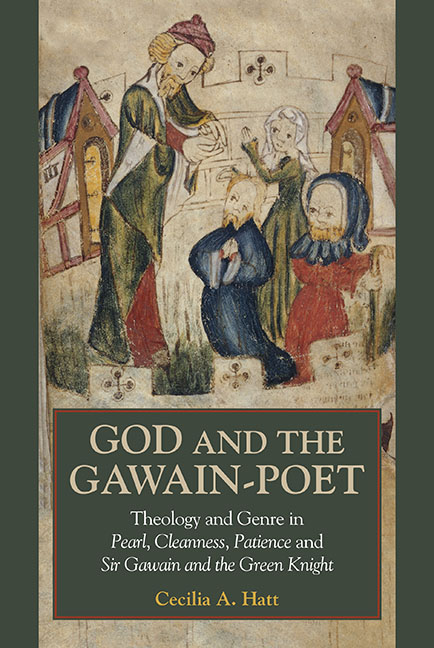 God and the Gawain-Poet
God and the Gawain-Poet Book contents
- Frontmatter
- Dedication
- Contents
- Preface and Acknowledgements
- Abbreviations
- Introduction: Signposts on the Trail of the Gawain-Poet
- Chapter 1 Pearl, the Jeweller’s Dream
- Chapter 2 The Difficulty of Cleanness
- Chapter 3 Patience and the Book of Jonah
- Chapter 4 Sir Gawain and the Green Knight: an Alternative Romance?
- Appendix: some Biographical and Contextual Speculations
- Select Bibliography
- Index
Preface and Acknowledgements
Published online by Cambridge University Press: 07 May 2022
- Frontmatter
- Dedication
- Contents
- Preface and Acknowledgements
- Abbreviations
- Introduction: Signposts on the Trail of the Gawain-Poet
- Chapter 1 Pearl, the Jeweller’s Dream
- Chapter 2 The Difficulty of Cleanness
- Chapter 3 Patience and the Book of Jonah
- Chapter 4 Sir Gawain and the Green Knight: an Alternative Romance?
- Appendix: some Biographical and Contextual Speculations
- Select Bibliography
- Index
Summary
GOD and the Gawain-poet is about the poetry composed by a clever and committed medieval Christian who was also a writer of genius. The ‘theology and genre’ of the book's subtitle should be taken as one single concept, of how the poet's belief in God informed his use of literary genres and how the genres that were available to him became voices for that belief. I have no formal theological training; this study was undertaken after I had for a long time wondered that, although it seemed obvious that a person's religious beliefs would affect the way he expressed himself, there was no accepted methodology for analysing or describing the relationship between theological or confessional identity and literary text. This lack became apparent during my experience of reading and editing the English writings of Bishop John Fisher of Rochester, who was preaching at a time when nuances of religious orientation not only proclaimed themselves in different literary styles but were actively identified, approved or condemned according to these differences. Over the last ten years or so, there has been some discussion of the Reformed opposition to metaphor, though as yet little, as far as I am aware, of the theological implications of variety in discursive or narrative structure.
Scholarly dissatisfaction with this state of affairs has assisted the rise in recent times of ‘Literature and Theology’ as a separate academic discipline with its own journal, courses and distinguished writers and teachers. Although I hope God and the Gawain-poet will be of interest to the latter, I hesitate to offer it as a contribution to the ‘Literature and Theology’ body of work, because it is not an interdisciplinary venture and the ideas that fuelled it have their roots in discussion and speculations that are in some cases more than thirty years old.
The bodying forth of theological/doctrinal difference in language forms is a potentially huge and fascinating area of study, and I embarked on it at first hoping to explore the contrasting religious world-views behind allegorical and figurative writings. It proved to be a slippery subject, however, and my grateful thanks are due to Vincent Gillespie, who gave me the idea of applying my ideas to the Gawain-poet and patiently encouraged me throughout the long and painful business of turning them into something intelligible.
- Type
- Chapter
- Information
- God and the Gawain-PoetTheology and Genre in <I>Pearl, Cleanness, Patience</I> and <I>Sir Gawain and the Green Knight</I>, pp. viii - ixPublisher: Boydell & BrewerPrint publication year: 2015
